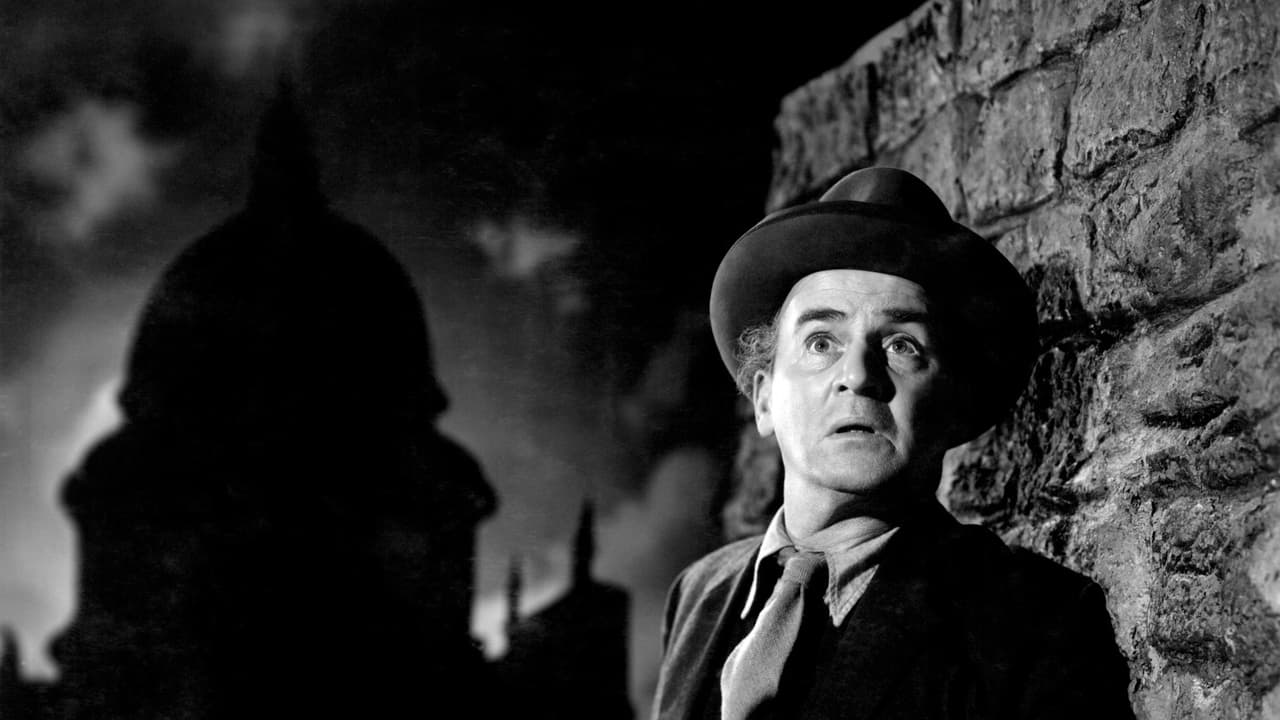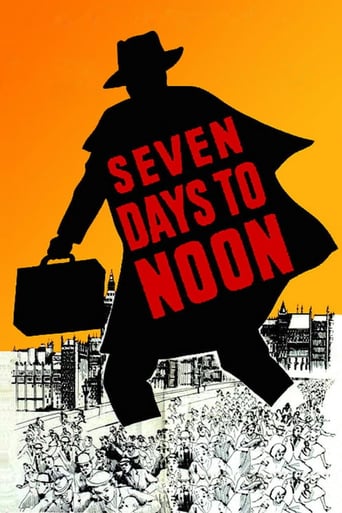GamerTab
That was an excellent one.
RipDelight
This is a tender, generous movie that likes its characters and presents them as real people, full of flaws and strengths.
zardoz-13
The respected Brothers Boulting John and Roy depict London on the brink of certain annihilation in their suspenseful, spine-tingling, black & white, disaster thriller "Seven Days to Noon," a taut white-knuckled parable about unreasonable professor gone mad who plans to destroy London with a stolen nuclear weapon that fits into a suitcase. This lunatic is no idiot, but he is suffering from fatigue of creating one of the deadliest weapons on Earth and he himself will detonate it if the British Prime Minister refuses to halt a program designed to develop weapons of mass destruction. Co-director and scenarist Roy Boulting of "Run for the Sun" and "The 39 Steps" remake writer Frank Harvey have fashioned a gripping melodrama based on a provocative story written by Paul Dehn (later to pen "Goldfinger" as well as several sequels for the original "Planet of the Apes" movies) and James Bernard. Unlike Dehn with whom he shared story credit, Bernard became better known for the orchestral scores that he wrote for Hammer horror epics. Incidentally, Dehn and Bernard received the Oscar for Best Writing, Motion Picture Story during the 1952 Academy Awards. The Boulting Brothers were nominated for the Golden Lion at the Venice Film Festival in 1950, and "Seven Days to Noon" was nominated to the BAFTA Film Award in 1951. Mind you, this 94-minute melodrama still holds up in terms of tension and suspense right up to the end. The Boultings have managed a marvelous feat in capturing the hysteria when the government decides to evacuate the area that the bomb will obliterate before the titular deadline. Professor Willingdon (Barry Jones of "The Bad Lord Byron") mails a letter with an ultimatum to the British Prime Minister (Ronald Adam) that seven days from then, he will trigger a devastating UR12 bomb developed at a secret British scientific research laboratory. Scotland Yard Superintendent Folland (André Morell of "The Bridge on the River Kwai") heads up the investigation while all of London prepares to meet their maker. Gradually, the Boulting generate suspense until you're ready to gnaw off your fingernails. The authorities play a game of cat and mouse to run down the mad scientist but he stays a step ahead of them. Although he changes his appearance by shaving off his mustache, the desperate Willingdon finds it difficult to avoid not only detection or capture because his photograph has been posted all over London. This is one British thriller that takes itself seriously and gains momentum right up to the very last second. A must-see for film historians that are studying the development of anti-nuclear bombs cinema in the early 1950s. Incidentally, the cinematographer who lensed "Seven Days to Noon" was none other than "Star Wars" lenser Gilbert Taylor. James Bond fans will spot Geoffrey Keen in a small role in a scene at a bar where Willingdon goes to have a brandy and soda. André Morell is terrific as the level-headed Scotland Yard Superintend who leads the manhunt for Willingdon. Several times throughout the narrative, our conscientious scientist eludes the authorities just when they are about to pounce on him. The shots of desolate London locations evacuated look thoroughly convincing, and the Boultings forge the atmosphere of paranoid. Altogether, "Seven Days to Noon" ranks as top-flight entertainment.
dougdoepke
On first seeing this movie in the late 50's, one bomb in a guy's suitcase seemed mild since millions like me were facing full-scale nuclear war from the skies at any moment. At least this anguished soul (Jones) gives a week's warning. Now, of course, the baggage-check bomb looks suddenly prophetic and much scarier. One question to ponder is the logic behind the professor's threat. It's strictly utilitarian—better to lose a few million people than a few billion! After all, that same utilitarian calculus is typically used in wartime without controversy. Just how crazy, then, is this guy. Note that the screenplay avoids mention of this sort of irony or the question of its rationality.It's a tense film, but a curiously unemotional one, considering what's at stake. Perhaps it's the British tradition of stiff upper lip, or maybe the movie functions as an entertaining training film on how people should act during evacuation. But whatever the reason, no one gets very excited despite the apocalyptic threat. I suspect a Hollywood version would behave quite differently. At the same time, as someone who's never been to London, I enjoyed seeing the sights. And since many appear to be landmarks, likely the decades haven't changed much. Anyway, this has to be one of the few films on record to actually gain topicality after a 60- year passage and is well worth catching up with.(In passing— The 49th Man (1953) is the only Hollywood period film I know of dealing with the threat of a suitcase bomb. There, it's foreign agents smuggling A-bomb parts into US for later use. It might be helpful to point out that Soviet aviation was still a year away from a long-range delivery system.)
writers_reign
Despite a long and active career, which included amongst other things supplying the off-screen 'voice' of Lord Haw Haw in Twelve O'Clock High and creating the role of Socrates in the Broadway production of Maxwell Anderson's Barefoot In Athens, Barry Jones was relatively unknown to cinema-goers in 1950 which made him an ideal choice for Professor Willingdon who, well-shod in London, intends to detonate a nuclear device in its centre unless the Prime Minister agrees to issue a statement prepared by Willingdon. This is one of those British films that DO stand up half a century later which is not, of course, the same as saying they are without flaws - for one thing we never see Willingdon until he has stolen the nuclear device, left home, wife and daughter and made his way to London. What we feel the loss of is a sense of seeing him being slowly driven from brilliant scientist and nondescript family man to someone prepared to unleash devastation on a great capital city. Joan Hickson and Olive Sloan are both solid in support as is Andre Morrell, charged with the task of finding Willingdon but others characters, Willingdon's daughter, his colleague and son-in-law-in-waiting are cheapest cardboard cutouts. Overall the pace is the thing that keeps it interesting, that and the period 'feel' of a lost London. Definitely worth a look.
mail-2978
In this day and age when atomic weapons are everybody's bow and arrows the plot of this film has never been more up to date. The setting of the film in London with the devastation left by the bombing in World War II made a great back drop for the story. I can remember when London really looked like that. Both the plot and the characterisation are believable and the acting more than adequate. But star status must go to the people of London who back in 1950 still had the camaraderie and spirit forged by six years of war. This was a time when people still looked out for each other and this come over well as the story unfolds. With our video making mobile telephones and instant access to news this film may seem tame and dated but don't let the black and white format fool you this is a good story, well told and well worth seeing. Oh, and by the way, we really did talk like that back in 1950.

